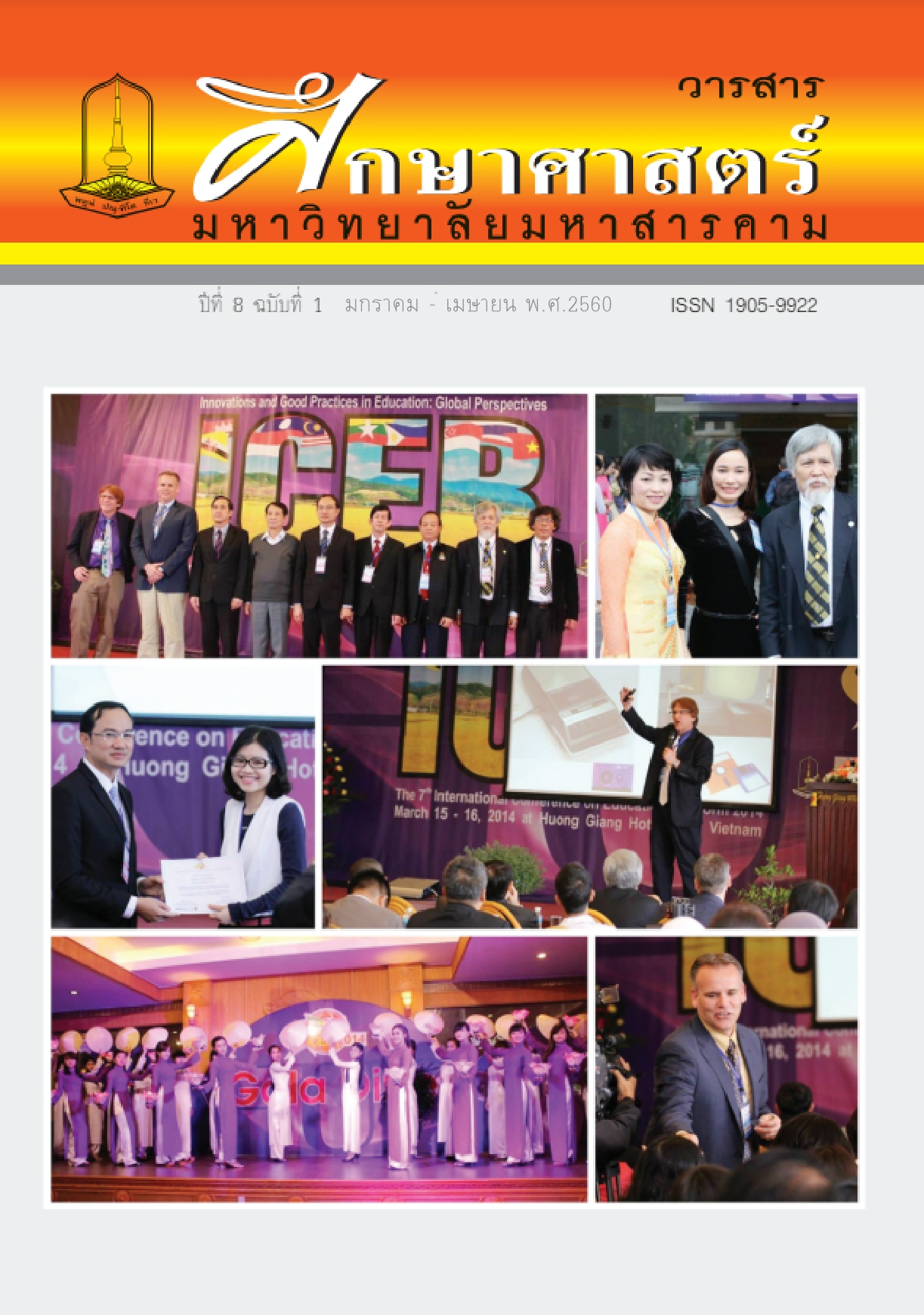Development of Knowledge Management Guideline for School in Nakhon Ratchasima Primary Education Service Area Office 7
Main Article Content
Abstract
The objectives of this research were: 1) to study the component and indicator of knowledge management for school in NaKhon Ratchasima Office of Primary Educational Service Area 7 2) to study the current situation and need for knowledge management 3) to develop guideline knowledge management of the Office of Primary Educational Service Area 7 Nakhon Rachasima. The Research and development was administered in this study. The area and target group were the Office of Primary Educational Service Area 7 Nakhon Rachasima. The respondents were 370 school administrators and teacher. The instrument used in this study was a survey of current conditions and the adverse conditions of the schools under the Office of Vocational Education Primary 7 The statistics used for data analysis were percentage, mean, and standard. The research method logy is are classified into three stages, the first phase consists of the elements and indicators of knowledge management in schools. Primary Educational Service Area Office of Vocational seven Phase 2 study the current state and the desired state of knowledge management in schools. Under the jurisdiction of the District 7 Elementary Nakara Ratchasima.
The research findings revealed that: 1. The components of knowledge management for schools consisted of 4 components: 1) Knowledge construction and 2) knowledge exchange 3) knowledge collection and 4) apply knowledge
2. The current state of knowledge management for schools under the Office of Education Primary 7 overall operations at a high level. The condition is desirable for schools under the jurisdiction of primary education in the county Ratchasima seventh overall at a high level.
3. Result analysis and interviews to see traced of knowledge management can analyze interviews and study trace elements of knowledge management, knowledge management base. 1) Corporate Analysis 2) Executive Leadership 3) Strategic plan, vision, mission and goals 4) The team set 5) Work by everyone involved 6) Behavior modification work. 7) Using information technology support, knowledge management success 8) Public relations. 9) Budget support 10) Know ledge exchange 11) Knowledge construction 12) The award success
Downloads
Article Details
References
กีรติ ยศยิ่งยง. (2549). การจัดการความรู้ในองค์การและกรณีศึกษา (พิมพ์ครั้งที่ 2). กรุงเทพฯ: มิสเตอร์ก๊อปปี้.
จัตุพร ปูเรือน. (2554). การจัดการความรู้ในโรงเรียนเวียงแหวิทยาคม จังหวัดเชียงใหม่. เชียงใหม่: มหาลัยเชียงใหม่.
ชุติกาญจน์ ศรีวิบูลย์. (2554). การพัฒนารูปแบบการจัดการความรู้ของมหาวิทยาลัยราชภัฎ. วิทยานิพนธ์ ดุษฎีนิพนธ์, มหาวิทยาลัยรามคำแหง.
ประพันธ์ ผาสุกยืด. (2550). การจัดการความรู้ ฉบับมือใหม่หัดขับ. กรุงเทพฯ: ใยไหม.
บูรชัย ศิริมหาสาคร และพัดชา กวางทอง. (2552). สรรพวิธีจัดการความรู้สู่องค์กรอัจฉริยะ. กรุงเทพฯ: แสงดาว.
บุญดี บุญญากิจ และคณะ. (2548). การจัดการความรู้จากทฤษฎีสู่การปฏิบัติ. พิมพ์ครั้งที่. 3 กรุงเทพฯ: จิรวัฒน์ เอ็กซ์เพรช.
วิจารณ์ พานิช. (2547). การจัดการความรู้. กรุงเทพฯ: สถาบันส่งเสริมการจัดการความรู้เพื่อสังคม (สคส.) 2547 ข.
วิจารณ์ พานิช. (2552). สถาบันส่งเสริมการจัดการความรู้เพื่อสังคม. จาก http://www.kmi.or.th/kmiarticles/prof-vicharn-panich/35-0008-triangle-k.html
วันทนา เมืองจันทร์ และคณะ. (2548). การจัดการความรู้ในสถานศึกษา. นครปฐม: สถาบันพัฒนาผู้บริหารการศึกษา กระทรวงศึกษาธิการ.
ทรงศักดิ์ สายเชื้อ. (2543). ทิศทางการพัฒนาของไทย: เส้นทางสู่ระบบเศรษฐกิจสังคมความรู้กระทรวงการต่างประเทศ. กรุงเทพฯ: สมาคมสโมสรสราญรมย์ร่วมกับสำนักงานกองทุนสนับสนุนการวิจัยกระทรวงการต่างประเทศ.
ณพศิษฎ์ จักรพิทักษ์. (2552). ทฤษฎีการจัดการความรู้. กรุงเทพฯ: วิทยาลัยศิลปะสื่อและเทคโนโลยี. มหาวิทยาลัยเชียงใหม่.
พรพิมล หรรษาภิรมย์โชค. (2550). การศึกษาสภาพการจัดการความรู้ของโรงเรียนสังกัดสำนักงานเขตพื้นที่การศึกษาในเขตภูมิภาคตะวันตก. วิทยานิพนธ์ปริญญาดุษฎีบัณฑิต, จุฬาลงกรณ์มหาวิทยาลัย.
ยุทธนา แซ่เตียว. (2548). การวัด การวิเคราะห์ และการจัดการความรู้ (พิมพ์ครั้งที่ 2). กรุงเทพฯ: ซีเอ็ดยูเคชั่น.
เสนาะ กลิ่นงาม. (2551). การพัฒนารูปแบบการจัดการความรู้ในมหาวิทยาลัยราชภัฎ. วิทยานิพนธ์ ปริญญาดุษฎีนิพนธ์, มหาวิทยาลัยรามคำแหง.
สถาบันพัฒนาผู้บริหารการศึกษา. (2548). การจัดการความรู้ในสถานศึกษา. กรุงเทพฯ: สถาบันพัฒนาผู้บริหาร.
ธีระวัฒน์ เยี่ยมแสง. (2550). การพัฒนารูปแบบการจัดการความรู้ของสำนักงานเขตพื้นที่การศึกษามหาสารคามเขต 1. มหาสารคาม: มหาวิทยาลัยมหาสารคาม สำนักวิทยบริการ.
นวลลออ แสงสุข. (2550). การศึกษาการจัดการความรู้ของมหาวิทยาลัยรามคำแหง. กรุงเทพฯ: มหาวิทยาลัยรามคำแหง. สำนักหอสมุดกลาง.
Nonaka, I., &, Takeuchi,H. (1995). The knowledge – creating company: How Japanese Companies create the dynamicsof innovation. New York: Oxford University Press.
Butcher, T.G., et al. (2001). Specifications, tolerances, and other requirements for Weighing and Measuring Devices: As Adopted by the 86 th national Conferenceon weights and Measures. washington: US Government Printing office.


